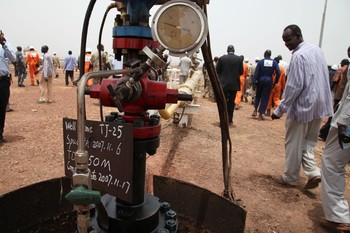Unity deputy governor warns oil shutdown will have greater impact on Sudan
By Bonifacio Taban Kuich
July 19, 2013 (BENTIU) – Unity state’s deputy governor, Michael Chiengjiek Geay, has warned Khartoum that moves to shut down oil flows from landlocked South Sudan, could further worsen relations between the two countries, despite several agreement attempts this year.

The deputy governor also accused Khartoum of trying to shift focus from its own internal problems by placing blame on South Sudan.
He said Sudan should accept the help of the international community to resolve issues between the two countries and “clean their dirty internal conflicts” before threatening to shut down oil flows.
Geay also emphasised that rather than destabilise the South Sudanese economy, it would be Sudan most severely “affected” by an oil shutdown.
“Those threats of Khartoum to me are baseless and we will still survive, it will be actually Khartoum who will suffer more than us, because we have got agriculture and we have got livestock and we have made use of those for the last two years and our people are very much happy than before”, said the deputy governor.
Geay said the oil stand-off will hamper development activities, but added that these would progress gradually.
He expressed hopes that a new oil refinery to be opened in Unity’ state would boost the economics of the state, as well as the whole country.
In an interview with Sudan Tribune on Thursday, Geay said that the postponement of the refinery’s opening was due to delays in essential equipment reaching the site.
“The only reason for [the] delay is because of the roads accessibility of which some of the heavy equipments are stranded somewhere between Unity state and Warrap in the west and somewhere between Unity state and Lakes [state] so this is the reason that made the opening to be a little bit behind”, added Geay.
He said the construction of the oil refinery would help the new country meet local fuel consumption needs domestically.
“The government of South Sudan are establishing this refinery to be built in Unity state and also the other plans to build another one in Upper Nile because we want to be self-reliant instead of relying on the pipe line that [is] transporting our oil from the South to the north”, the deputy governor said.
Geay says the process towards self-reliance would help free South Sudan from its dependence on Sudan’s “on and off” pipeline, adding that it was hoped the new refinery would supply markets nationwide and reduce high inflation across the country’s 10 states caused by rising fuel costs.
South Sudan had received a notification from
In June, the Sudanese government officially notified South Sudan that pumping station will be shut off on 7 August.
The move came as Khartoum continued to accuse the South Sudanese government of giving support to rebels from the Sudan People’s Liberation Movement-North (SPLM-N) active in Sudan’s Blue Nile and South Kordofan states.
However, an official in South Sudan has denied the government is providing support to rebels, referring to it instead as “internal disputes with Sudan” and accusing Khartoum of backing an ongoing rebellion in Jonglei state led by David Yau Yau.
Oil flows resumed between the two countries had only recently resumed after South Sudan halted production last January due to a dispute over transportation fees.
In an increasingly bitter argument, the South also accused Sudan of diverting its oil for the latter’s own profit.
The shutdown sparked severe economic downturn in both countries as a result of the loss in oil revenues.
(ST)
